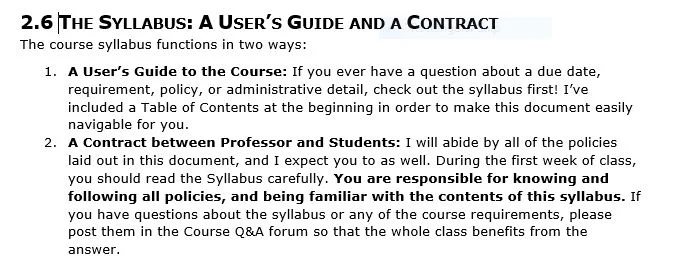The Late-and-Missing Work Conundrum, Part 2: What’s Wrong with Traditional Approaches?
In the first part of my essay series on coping with late-and-missing student work, I outlined what I see as the problem with typical policies that count missing assignments as a zero and stringently penalize late work. Before I present my current philosophy and policies, though, I would like to address some reasonable objections that might already have occurred to any teachers who are reading this.
The Accountability Argument
When asked to explain the rationale behind their late-and-missing-work policies, many instructors will justify their philosophy by saying that late-and-missing policies must teach students accountability. Here are some quotes drawn from Jeannie Loeb’s Conversations about Teaching (see my review of Loeb's book here), which illustrate typical perspectives that I’ve heard many college professors express:
- “[Students] are grown-ups and this is the way that a lot of life is going to operate” (loc. 1250).
- Giving zeroes for missing work is “part of treating [students] like a grown up” (loc. 1250).
- “It’s probably unrealistic not to have deadlines in their jobs; [students] will have deadlines. I was trained that you never miss a deadline and that you never ask for more time. You get things done to the best of your ability given the context and then you move on. So I try to instill this as well” (loc. 1258).
- “This is about personal accountability and responsibility to make sure that you are thinking ahead of time” (loc. 1274).
What’s Wrong with Accountability?
Personal responsibility is, of course, a laudable virtue that all human beings ought to cultivate, but I don’t entirely buy into the “accountability argument” anymore, especially for online learning environments.
Significantly, the “accountability argument” assumes that college students mostly are young adults who have continued their education straight from high school. Many professors of traditional-age students believe their aim is not only to teach students about Victorian literature or microbiology, but also to help young people transition from immaturity to maturity. I’ve heard many professors at different institutions refer to their students as “kids” in casual conversation, and yet I’m not totally convinced that treating 18-21-year-olds as “not-quite-adults” is truly helpful. (That’s a topic for further research and thinking, though!)
Leaving that aside, though, all of my online students are adults and most of them have been for some time. My student population includes everyone from nineteen-year-olds to grandparents, primarily working adults who are balancing jobs and families with their education. In many cases, today’s college experience isn’t a sheltered environment that’s separate from the “real world.” Students don’t need to be shepherded toward maturity if they’re already independent adults.
And yet, if most of my students are working adults who understand deadlines, why do some of them fail to complete their work on time? The answer is that academic deadlines are not exactly equivalent to job deadlines. When my students miss a course deadline, it’s mostly not because they don’t understand the importance of deadlines. They’re aware of the course schedule and consequences for missing or late work, and yet they choose to prioritize other obligations over my class. And frankly, why not? Professors often act as though our class should be a student’s highest priority (even above other classes), but I think that it’s reasonable to acknowledge that student lives are a rich, complex tapestry of competing priorities.
Moreover, despite the insistence that the “real world” consists of firm deadlines that are enforced with no mercy by impersonal bosses, that’s actually not the way that all professional environments work. We’ve all probably heard of examples of everything from construction projects to software development taking longer than the estimated time. Deadlines exist on a continuum of both importance/triviality and rigidity/flexibility. Just as in the professional world, in academia not all deadlines are created equal. For example, work that includes a social component, such as weekly discussion, is no longer meaningful if it is submitted late.
I am not suggesting that professors have no responsibility to encourage accountability and punctual work. In fact, in online classes in particular, I think it’s crucial for students to keep up, for the benefit of their own learning experience. Online classes at my university are not self-paced, and if students start to miss weeks of material, they will find it difficult to catch up. In addition, deadlines are not just a learning tool for students; deadlines are also there to help instructors manage their own grading workload.
My Late-and-Missing Work Philosophy
Given all that I’ve just said, here’s what I think a good late-and-missing-work policy should accomplish:
- Acknowledge that students are whole people who make choices to meet or miss deadlines based on priorities in their own lives
- Encourage students who miss a deadline to get back on track with subsequent assignments and complete the course successfully
- Allow flexibility where possible and reinforce firm deadlines where flexibility is not possible
- Reward timely progress by providing incentives for on-time work
Next week, in the third and final part of this essay series, I will share my current late-and-missing work policy, which is an ongoing experiment in developing a policy that embodies these goals.
Work Cited
Loeb, Jeannie. Conversations about Teaching: Pedagogical Advice from 21 UNC Faculty. Amazon Digital Services, 2016. https://www.amazon.com/Conversations-About-Teaching-Pedagogical-Faculty-ebook/dp/B01N7HMTZG/



